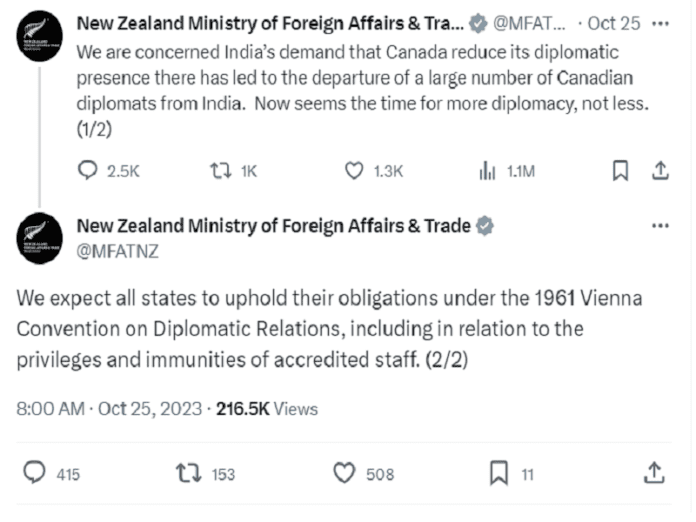All the “Five Eyes” have diplomatically united around Canada amidst its dispute with India after Australia, the Anglo-American Axis (AAA), and now New Zealand all released statements of support for Ottawa. The last-mentioned’s Ministry of Foreign Affairs & Trade tweeted the following on Wednesday:
“We are concerned India’s demand that Canada reduce its diplomatic presence there has led to the departure of a large number of Canadian diplomats from India. Now seems the time for more diplomacy, not less. We expect all states to uphold their obligations under the 1961 Vienna Convention on Diplomatic Relations, including in relation to the privileges and immunities of accredited staff.”
This dishonest framing of the Indian-Canadian dispute, which is more about the clash of polar opposite worldviews than an alleged assassination, impugns Delhi by implying several unsubstantiated criticisms of its behavior over the past month that’ll be briefly debunked in the present piece.
To begin with, the statement presents India’s request out of context by deliberately omitting any details about what led up to this decision. Those who are unaware of the indisputable fact that Trudeau declined to share any evidence in support of his scandalous accusation that India assassinated a terrorist-designated separatist inside his country might therefore think that Delhi has gone rogue.
The second point is that there hasn’t been any reduction in diplomacy between the feuding parties unlike what New Zealand suggested is now supposedly the case after those officials’ departure. Their return home has simply restored parity, and talks continue at the much higher Foreign Ministry level.
Third, unnamed Indian sources informed local media that those expelled diplomats had meddled in their country’s affairs by granting visas to separatists despite knowing their criminal histories. This revelation prompted speculation that Canada has an informal policy of sheltering such forces, perhaps with the tacit approval of its “Five Eyes” allies, as part of a larger anti-Indian Hybrid War pressure campaign.
The fourth point is that New Zealand ignored India’s accusation that Canada violated international law by not ensuring the safety of its diplomats. Instead, reference was only made to Canada’s claim that India violated this by threatening to strip its diplomats of immunity if they refuse to leave.
And finally, the aforesaid biases aren’t the result off innocent incompetence, but arguably serve as proof that New Zealand intended to impugn India through its malicious innuendo. Upon doing so and becoming the last “Five Eyes” state to take Canada’s side, there are now credible reasons to suspect that the Anglosphere is uniting against India on this issue, which bodes ill for Delhi’s future ties with that bloc.







